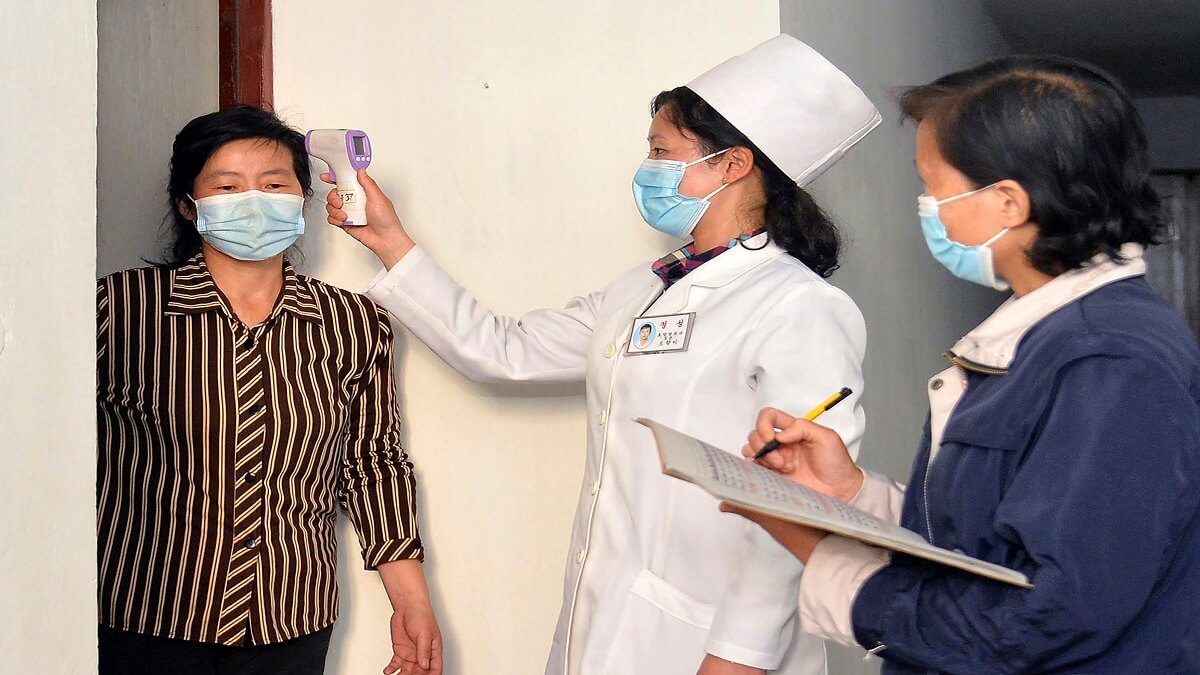North Korea claimed on Friday that the fever cases it registered earlier this week were found to be influenza cases, and not COVID-19, as earlier suspected.
A press release by the state-owned Korean Central News Agency (KCNA) cited information from the State Emergency Epidemic Prevention Headquarters which confirmed that “all the fever cases” that had been reported in the country’s Ryanggang Province earlier this week “were ones with influenza.”
The release said that “on the basis of the observation of clinical symptoms, survey of epidemiological relations and nucleic acid test for the fever cases,” medical experts had determined that the influenza virus had been the cause of the “fever outbreak.” It added that all cases have now “recovered with normal temperature.”
To this end, it reiterated recommendations from the country’s “public health and anti-epidemic organs,” asking all residents to give special attention to their health and wear masks. It also urged those with fevers to stay in isolation and “inform relevant organs in time… as influenza can easily occur” in any area of the country due to “the difference of atmospheric temperature” and “seasonal change.”
The body further instructed emergency anti-epidemic units to carry out the “identification, screening and examination of fever case(s) more strictly.” It also announced that the lockdown that had been put in place following the breakout has been lifted.
On Thursday, KCNA reported that emergency epidemic prevention units had “immediately locked down” the affected area and “urgently mobilised rapid mobile anti-epidemic teams… to carry out nucleic acid tests… for suspect cases, while taking measures to probe into the cause of the fever outbreak.” It added that experts were trying to discern if those with fever had “been infected by the malignant epidemic,” referring to COVID-19, and were examining “the source of the fever outbreak.”
The news came only a day after Pyongyang reiterated its “victory” over the COVID-19 pandemic, saying it had succeeded in maintaining “stability in the epidemic prevention work for two years and three months,” which it claimed was “the longest period in the world’s epidemiological history.” It asserted that the country had secured a “a great victory in the anti-epidemic campaign, which lasted 91 days after the top-level emergency anti-epidemic system was put in place.”
Supreme Leader Kim Jong-un first declared the secretive regime’s victory over the pandemic earlier this month. In a speech on August 10, Kim declared: “The anti-epidemic war, which has been so arduous, is over and today we proclaim our victory in it.” He noted that more than 100 days had passed since COVID-19 was first detected within its borders. Since then, Kim said that the entire Party and country had “achieved a great success in stabilizing and restoring the anti-epidemic situation with an indefatigable will and desperate efforts.” He also claimed that the country had witnessed only 74 COVID-19-related deaths in total, which was “a record low” and “an unheard-of miracle in the world public health circles.
In another speech that week, his sister Kim Yo-jong, the deputy department director of the ruling party, blamed South Korea for introducing the coronavirus in North Korea through leaflets, saying, “the recent national hardship sustained by us was definitely attributable to the hysteric farce kicked off by the enemy.” Kim asserted that since “the malignant pandemic disease” spreads through “contact with the objects infected with the malicious virus,” it was “a matter of grave concern” that the “disgusting ones” in South Korea were “scattering leaflets, bank notes, awful booklets and things over our [its] territory.” “From this scientific view, we come to draw a conclusion that we can no longer overlook the uninterrupted influx of rubbish from South Korea,” she said.
After more than two years of claiming to be free of COVID-19, North Korea declared a “severe national emergency” in May after admitting that there had been an outbreak of the highly contagious Omicron variant that was causing the country “great turmoil.” It subsequently imposed one of the world’s most stringent lockdowns. In total, North Korea reported about 4.8 million “fever cases” across its 26 million population. The country even abandoned its earlier reluctance to accept foreign assistance and reportedly asked China for vaccines.
Keeping in mind its lack of vaccines and adequate healthcare infrastructure, Shin Young-Jeon, a professor at Hanyang University's medical school in Seoul, told Reuters that North Korea’s reported 74 fatalities were “nearly impossible.” He claimed that the actual death toll could be up to 50,000. South Korea’s Unification Minister, Kwon Young-se, too, said that there were “credibility issues” with Pyongyang’s data.
North Korea Says Fever Cases Were Influenza, Not COVID-19, Despite Lockdown
It also urged those with fevers to stay in isolation and “inform relevant organs in time… as influenza can easily occur” in any area of the country.
August 26, 2022

IMAGE SOURCE: AP
